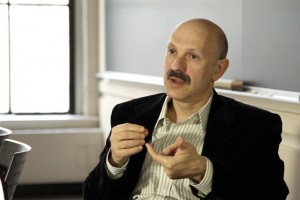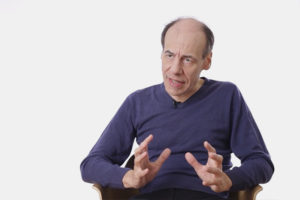Construction of the Soviet Cosmonaut
MIT Lecturer Vyacheslav Gerovitch on Sergei Korolev’s design bureau, the leadership of the Soviet cosmonauts, ...
Why does the attitude to immigrants’ religion differ in the USA and in Western Europe? What historical and socio-economic factors may contribute to animosity towards Muslims in France? How can believers from different religions coexist peacefully? These and other questions are answered by Chair of Sociology, Anthropology and Social Welfare at Augustana College Peter Kivisto.
We live in an age of global migration, and one of the things that this means is that countries in the so-called North and the West, in other words the rich developed countries, have been witnessing for the last several decades a huge wave of newcomers arriving at their shores. Now this has meant a whole lot of things in different contexts, but one of the things that it’s meant is that religion is on the move. Global religions are on the move. Catholics are moving from South America to the more Protestant North America, Muslims are moving into places like Western Europe where their presence has been quite small until relatively recently. And every other major religious group: Buddhists, you know, have moved in large numbers. Any of the great world religions have set up homes in places where they have no particular history.
For most of those religions this has thus far proven to be, relatively speaking, pretty unproblematic. So you can go to the suburbs of Chicago, near where I live, and you will see a huge – and I mean a truly huge – Hindu temple that’s been built. And it was built without controversy, without opposition from local people. You didn’t find Christian communities opposed to this structure. But the one case in which there has been a considerable lot of contestation is Islam.
One argument – and this is an argument that has been advanced by two sociologists in New York, Richard Alba and Nancy Foner – is that religion has managed to serve as a bridge in the United States, whereas in Western Europe it has tended to serve as a barrier. So the way in which the people who live in those places think about and respond to religion in general, not just Islam, but religion in general, shapes the way in which they respond to Islam – this is the argument.
Now, why does religion act as a bridge in the United States, presumably? Well, the argument is that the United States, when it was founded, was founded with the decision made right from the beginning that there would be no established religion. The state could not establish any religion. On the other hand, all the people were guaranteed the right to practice their own religion as they saw it fit. So there was a non-establishment clause, that is the government wouldn’t create religion or endorse a particular religion, and the idea that people have their own ability to believe what they want and act on those beliefs as they wish.
This was done, in no small part, for very practical reasons, because there was religious tension in the colonies before the United States became a nation. These were among Christian denominations, largely Protestant Christian denominations, not non-Christians: it didn’t have so much to do with Jews, there was a rather small Catholic presence. But nonetheless this has set the stage then for the way that the nation has responded to all religions ever since. So we have this general principle or principles that shape the way the nation responds to religion.
It’s also the case that the United States has been historically a highly religious nation. If you compare United States, you know, go to churches in the Unites States on any Sunday – there are people there. Go to churches in the Nordic countries, for example, and you’ll find essentially empty churches. And many other places in Western Europe with rare exceptions – places like Ireland, for example. Although I think that probably the attendance in Ireland has been declining in recent years.
The United States is, by all accounts, a more religious nation. It’s considered to be good to be religious.
It doesn’t make any difference what religion it is at some level, but it’s good to be religious. Dwight Eisenhower, when he was president in the 1950, said as much in a farewell speech. The idea is that the United States has found a way to accommodate religious pluralism. That’s the notion: we can live with religious pluralism, we are comfortable with it.
Now, I don’t want to overstate this, because if you know about the history of the United States, you’ll understand an awful lot of ugly stuff has happened. When Catholics came in large numbers, bad things happened: Catholics were attacked, churches were burnt. There was a very powerful strain of anti-Catholicism, powerful enough that it took till 1960 to finally elect a Catholic president of the United States. And Jews had an even tougher time, because they were not Christians. Anti-Semitism had a long and powerful history. The reason other religions didn’t bear the brunt of animosity was, to a large extent, that they weren’t there or they weren’t there in sufficient numbers that people paid any attention.
Now we have a new dynamic. And we have a relatively large and growing Muslim population. We have not had the kinds of outbursts that you find in Western Europe. There have been things that have happened. So, for example, in a place called Murfreesboro, Tennessee, there was an effort to build a mosque by a community that has been there for a quarter of a century. And locals fought tooth-and-nail in court, for a long long time, to prevent this mosque from opening, arguing at one point that Islam is not a religion. It seemed to me a rather questionable argument, but that was one of the arguments that they made before the court. Ultimately the Muslim Community in Murfreesboro, Tennessee, won the day, and their mosque, an Islamic Center opened.
So you have that, and then there’s another dynamic at play too. That has to do with the demographic character of Muslims in the United States vs. Western Europe. Muslims in the United States, first of all, are not the people who have come from a former colony, because we weren’t a colonial power. Well, with limits, but we weren’t really a colonial power. And what you have are Muslims who are, in general, highly educated, professional people, you have plenty of people who are doctors, lawyers and who are socioeconomically fitting into the larger society.
A very typical thing that happens is that when they have the resources to, for example, build a purpose, to build a mosque, in other words. You’re operating a storefront and now you build a building that’s going to look like a mosque, maybe with a minaret. There are plenty of people who are friends of Muslims, who work to help. Not that they’ll fund it, but, for example, when it’s opened, you have an ecumenical religious service at the mosque.
This happened in the area where I live in, in the heartland of the Middle West, when the first mosque opened. You had a rabbi, you had a Catholic priest and you had a Protestant minister – all taking part in this service. And hundreds of people from the community came. The mosque was not that large, they were going to have a big community dinner, and there was not enough space there, so the large Catholic church just down the street said: well, what we’ll do is just process down to our place and we’ll have the celebration there. That is a sort of a cooperative venture. It’s not that you don’t find that in Europe, but it’s harder to do this.
What’s different about Western Europe is, first of all, many of the Muslims come from former colonies, especially in France, obviously, and France happens to have the largest Muslim population of any developed country. So that’s another thing. Sheer demographics are these: there is a larger Muslim population in Western Europe in general and in certain countries in particular, than is the case in the United States. They come from former colonies, and so there is a whole issue of the post-colonial legacy that becomes part of this. And the other thing is they are less educated than their counterparts in the United States and Canada, in North America.
All this, what you see in France, for example, makes for a widespread alienation of young people who can’t find jobs, who are in many respects French: they speak French, they understand the culture, they’ve lived there all of their lives, and yet they can’t find jobs, they know they’re discriminated against, they know that when, as soon as a potential employer sees their name, their non-French sounding name, their chances of getting an interview for the job drop considerably.
A whole lot of what’s going on, although on the surface it looks like it’s religious, is in fact about socioeconomic marginalization.
And if you don’t believe that, one of the things that we know – we don’t know enough about some of this information, and one of the things that is a challenge for sociology is to understand, well, we say there are X number of million Muslims in France, for example, this means people who are nominally Muslim. Does it mean that they go to mosque every day, does it mean that they believe? No. It basically means they come from a Muslim-majority country, so we count them as Muslim.
What we know without the kind of rigor, an empirical rigor that we wish we had, but what we tend to know is that most Muslims in Europe, and for that matter in North America, are not particularly religious. Some are areligious, but most are tenuously attached to the Islamic heritage. It’s probably the case that more Muslims practice their religion in the United States, because what they’re doing is adapting and adjusting to a culture that expects people to be religious. And maybe people are adapting and adjusting in Western Europe to a culture that expects people to be secular. But there is a powerful streak of secularism within the Muslim community, and that’s something that needs to be reckoned with.
So there are a number of reasons why you have these differences, but another feature of this – and you can see this in Germany, you can see it in the Netherlands, some people talk about the Netherlands as a country that has retreated from being open, tolerant, liberal and multicultural, to being more insular and so on. The way in which the Dutch dealt with diversity a hundred years ago, was – they would look at the three major communities that were at odds with each other: Catholics, Protestants, and secular people, largely socialists, and what they did was they created institutions, they created an institutional structure for each of those communities, so they could live separate lives. They call them pillars, the three pillars. And that’s not multiculturalism in my view, that’s a kind of separatism.
What the Dutch, as it turns out, did when they build themselves as being multicultural twenty five years ago basically was that they rehabilitated the old pillar structure and tried to apply to new circumstances where you have newcomers, especially Muslims. That’s not a way of being successful if what you’re trying to do is incorporate people at some level into the mainstream while protecting diversity. I think that’s one of the problems that has ensued in places like the Netherlands. In France, compounding the whole problem, is that the country sees itself as secular, in a legal way, but also in a more culturally specific way. And they see the separation of the church in state, they don’t want religion in the public sphere at all. That compounds the difficulties for people who, at some level, take their religion seriously.

MIT Lecturer Vyacheslav Gerovitch on Sergei Korolev’s design bureau, the leadership of the Soviet cosmonauts, ...

Sociologist Viktor Vakhshtayn on competition between scientists and experts, the survivorship bias, and the me...

Philosopher and sociologist of science Steve Fuller on collective and individualistic nature of knowledge, eli...